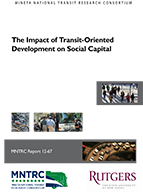Abstract:
This paper focuses on the ability of Transit Oriented Development (TOD) to improve social capital and interactions within a community. The expectation is that TOD has a positive impact on the lifestyle and activities of individuals who reside, work, and frequent these locations, and that this can include increases in social capital. Using data from a survey of transit station locations in New Jersey, the authors examine how proximity to the station and various built environment variables are associated with different measures of social capital, derived from responses to survey questions. These questions inquire about respondents’ perceptions of their neighborhood as a place to live, sense of community, knowing their neighbors, trust, and whether their community is a good place to raise a child. The authors also include a question on volunteering in the community. These questions reflect various domains of social capital as established in the literature. Results generally do not support the hypothesis that social capital is associated with transit station proximity and TOD. Features of the built environment, proxied by population and employment density, are also not associated with increased social capital, and in some cases have a negative association. While there are some limited positive associations with some of the social capital variables, one of the strongest indicators is living in a detached family home.
Authors:
ROBERT B. NOLAND, PH.D.
Robert B. Noland is a professor at the Edward J. Bloustein School of Planning and Public Policy and serves as the director of the Alan M. Voorhees Transportation Center. He received his Ph.D. in Energy Management and Environmental Policy from the University of Pennsylvania. Prior to joining Rutgers University, he was Reader in Transport and Environmental Policy at Imperial College London, a policy analyst at the U.S. Environmental Protection Agency, and he also conducted postdoctoral research in the Economics Department at the University of California, Irvine. The focus of Dr. Noland’s research is the impact of transport planning and policy on both economic and environmental outcomes. Work on economic effects has included examining behavioral reactions to changes in reliability, associations with the built environment, and trip-chaining behavior. Environmental work includes impacts on safety, climate, health, and other factors associated with overall quality of life. Active research areas include developing methods to evaluate the life cycle greenhouse gas emissions associated with building transport projects; evaluating the economic impacts of transit-oriented development; analysis of walking behavior and links to other travel behavior and the built environment; analysis of traffic and pedestrian safety using spatial analysis techniques; and assessment of the economic effects of transport investments, in particular those associated with agglomeration externalities. Dr. Noland’s research has been cited throughout the world in debates over transport infrastructure planning and environmental assessment of new infrastructure. He is currently Associate Editor of Transportation Research-D (Transport and Environment) and the International Journal of Sustainable Transportation and is former Chair of the Transportation Research Board Special Task Force on Climate Change and Energy.
ORIN PUNIELLO, M.P.P.
Orin Puniello is a Senior Project Manager with Ketchum Global Research & Analytics and is responsible for the design and execution of predictive analytic modeling. Prior to joining Ketchum in September 2015, he was the Assistant Director for Research at the Bloustein Center for Survey Research (BCSR) at Rutgers University. At BCSR, he was responsible for the design, analysis, and day-to-day management of survey projects in areas including transportation, economics, and social policy. During his time at BCSR, Orin directed seven federal- or state-funded projects. He is experienced in the design and execution of complex sampling strategies for household and firm surveys. Orin is currently pursuing a Ph.D. in Planning and Public Policy with a concentration in survey research and transportation policy at Rutgers University. He received a Masters of Public Policy (M.P.P.) from the Bloustein School at Rutgers University in 2008 and a B.A. in history and political science from Rutgers University in 2004.
STEPHANIE DIPETRILLO
Stephanie DiPetrillo is Senior Research Specialist at the Alan M. Voorhees Transportation Center, Rutgers University. She has more than ten years of experience in transportation and urban planning research. Her current work combines quantitative and qualitative techniques and examines connections between transportation and land use, principally transit, community transportation, and transit-oriented development (TOD). Increasingly her work has examined ways to improve access to transit by all users, including people with disabilities. Past works include: MNTRC supported publications Exploring Transportation, Employment, Housing, and Location Issues for New Jersey Veterans with Disability (12-28) and Measuring Benefits of Transit Oriented Development (12-18); A Strategy for Getting People with Disabilities to Work: Supporting NJ County Transportation and Connecting to Jobs by Connecting to Transit funded by the NJ Department of Human Services; Eliminating Barriers to TOD, Economic Development Benefits of New Transit Service: RiverLINE, and The Impact of Demographic Changes in Transit Patterns in New Jersey funded by the NJ Department of Transportation Research Bureau; and An Evaluation of Property Values in New Jersey Transit Villages funded by the New Jersey Association of Realtors Governmental Research Foundation. She is the editor of the online publication NJTOD.org, home to the Transit-Friendly Development Newsletter sponsored by NJ Transit, and is an advisor to The TOD Line, an online newsletter of TOD in New York and Connecticut. She has taught at Hofstra University, Rutgers University, and the New Jersey Institute of Technology (NJIT).


